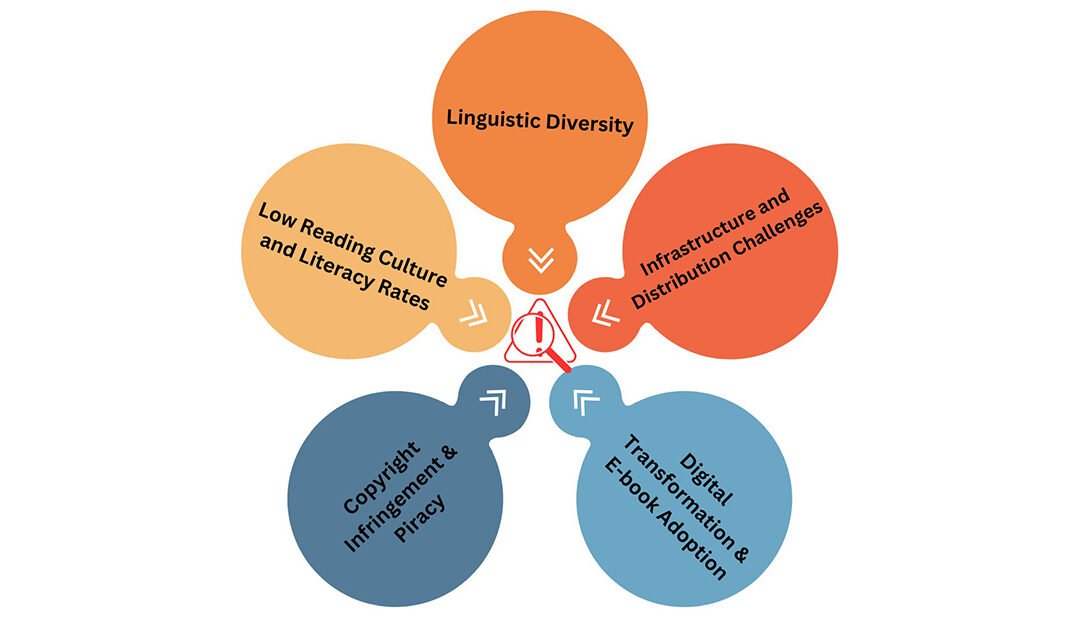The Indian publishing industry, renowned for its rich literary heritage, diverse languages, and vast readership, is critical to the country’s cultural and intellectual landscape. However, beneath its thriving facade, the industry faces numerous challenges that impede its growth and sustainability. In this article, we delve deeper into the hurdles confronted by the Indian publishing industry and shed light on the factors that contribute to these challenges.
Linguistic Diversity:
One of the defining characteristics of India is its linguistic diversity, with over 120 languages supported by 1,600 dialects. Publishers must contend with the task of catering to a wide range of linguistic groups, each with its unique set of readership demands. This linguistic fragmentation limits economies of scale, making it difficult for publishers to reach wider audiences beyond regional markets.
Low Reading Culture and Literacy Rates:
Despite its vast population, India faces a relatively low reading culture. A significant proportion of the population needs to be more literate or have limited access to quality education, which affects book sales and reader engagement. The low literacy rates and lack of reading habits directly impact the demand for books, making it challenging for publishers to sustain profitability and invest in new authors and content.
Infrastructure and Distribution Challenges:
Another hurdle faced by the Indian publishing industry is inadequate infrastructure and distribution channels. India’s vast geographical expanse and diverse demographics make the distribution of books a logistical challenge. Many areas, particularly rural regions, need proper bookselling infrastructure, making it difficult for publishers to reach potential readers. Limited access to reliable distribution networks, coupled with high transportation costs, affects the availability and affordability of books, especially in remote areas.
Copyright Infringement and Piracy:
Copyright infringement and piracy are persistent problems that plague the Indian publishing industry. The prevalence of unauthorised book reproductions and digital piracy significantly impact sales and revenue. Pirated copies of books are often sold at lower prices or even distributed for free, eroding the legitimate market and causing financial losses to authors, publishers, and the industry. Ensuring robust copyright protection and enforcement safeguards publishers’ interests and promotes a thriving publishing ecosystem.
Digital Transformation and E-book Adoption:
While the digital revolution has transformed several industries, the Indian publishing sector has slowly adapted to digital formats. The transition from print to digital publishing comes with challenges, including infrastructure limitations, low digital literacy rates, and a need for standardised platforms for e-books. Publishers must embrace digital technologies and explore innovative ways to tap into the growing demand for e-books, online reading platforms, and audiobooks to reach a broader audience base.
The Indian publishing industry is a vibrant and diverse sector facing its challenges. Overcoming these hurdles requires a concerted effort from various stakeholders, including publishers, authors, government bodies, and readers. By addressing the linguistic diversity, improving literacy rates, investing in infrastructure, combating piracy, and embracing digital transformation, the Indian publishing industry can unlock its full potential and flourish in the digital age. The industry can foster a vibrant reading culture through collective action and innovative strategies, preserve its literary heritage, and propel Indian authors and publishers onto the global stage.
Rachnaye is such a platform which enables the paperback/hardbound world to coexist with the digital one. Publishers can benefit from the technology, data and marketplace to find the right target audience for their published books. Writers can build their credibility here, get polished, and reach out to publishers to become bestsellers. Readers can get access to all different kinds of books in all different kinds of consumable forms, i.e. Paperback, Digital, Audio.
